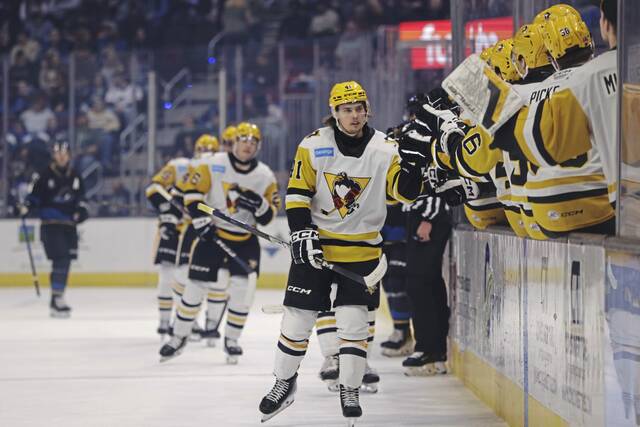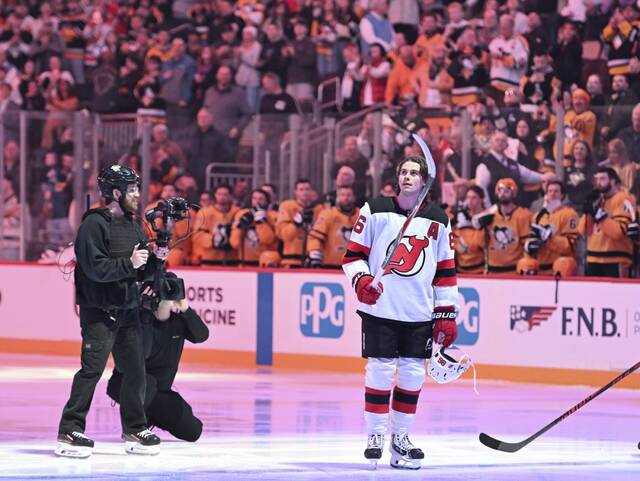There really is no way to compare Dave Burrows with Brian Dumoulin.
Burrows, roundly considered the best defensive defenseman in Pittsburgh Penguins franchise history, primarily played in the 1970s. Dumoulin, who by most measures is the current team’s top defensive blue-liner, made his NHL debut in 2013.
• Virtually every second of Dumoulin’s on-ice activities are recorded in real time by NHL statisticians, run through various algorithms and turned into analytical data available to anyone within range of a WiFi signal. With Burrows, a metric seemingly as basic as time on ice was not yet a concept for the NHL to maintain.
• There are plenty of highlights, interviews and other clips of Dumoulin on YouTube. Burrows? He might as well not exist as far as online video is concerned.
• Anyone with free time — and that’s not exactly in short supply these days — literally can watch every shift of Dumoulin’s career with an online subscription to the NHL’s video service. For Burrows, analysis of his play might be limited to an anecdote (which probably has morphed more into a fable) of an uncle who got free tickets to a game at the Civic Arena in 1977 and saw Burrows take a puck to the face against the Minnesota North Stars then finish the game with 27 stitches on his shattered nose.
Burrows was a two-time All-Star for mostly ho-hum teams. Dumoulin was a vital component of two-time Stanley Cup championships.
It’s nearly impossible to weigh them against each other.
Unless you’re Jim Rutherford.
As a goaltender for the Penguins in the early 1970s and the team’s current general manager, Rutherford has a unique perspective as Burrows’ teammate (and the benefactor of all those shots he blocked) as well as Dumoulin’s boss.
“There’s a lot of comparisons,” Rutherford said during a phone conversation with the Tribune-Review on Tuesday. “(Burrows) was a wonderful person and a wonderful team guy. And that leads me into Brian Dumoulin before I talk about what he does on the ice. He is really one of the quiet leaders on the ice now. He has been for a few years. And such as good person.”
Dumoulin has been designated as an alternate captain at times this season when injuries have hindered the players who normally inhabit those roles. Burrows routinely served the same role throughout the 1970s.
“Then you go to his game on the ice, there’s a lot of similarities in his game to Dave Burrows from a defensive point of view,” Rutherford said. “When you look at Brian Dumoulin over the last number of years here, going from winning the (Stanley Cup titles) and right through to now, you could make the case that he’s our most consistent defensemen of all our guys.”
Rutherford stopped short of saying one player was better than the other.
But it’s clear how he feels Burrows, who played during a somewhat disorganized era of the 1970s, would fare in today’s highly regimented game.
“He could play in any era because he was a good skater and smart,” said Rutherford, who labeled Burrows as a close friend during their careers. “Just really one of the best defensive defensemen in the league.”
“He was so smart. I can’t say he didn’t make any mistakes. … But he made very, very few mistakes. Couldn’t beat him one-on-one. At that time when he played, he probably didn’t get the recognition he deserved. He was probably the best defensive defenseman in the league. The offensive guys always get the recognition. But he’s certainly in the group of defensemen that are the all-time best of the Penguins.”
The same can be said of Dumoulin given his role on the 2016 and ’17 Stanley Cup championship squads. While he served as something of a counterbalance to the gambles of defensive partner Kris Letang in ’16, Dumoulin was essentially the team’s No. 1 defenseman during the ’17 run as he led the team in average ice time (21 minutes, 59 seconds) during that postseason in the absence of Letang, who was recuperating from a severe neck injury.
Now, Dumoulin, who missed 37 games this season because of a left ankle injury, is routinely one of the first players sent over the boards to open a penalty kill and, along with Letang, he regularly draws assignments against the opponent’s top forwards.
But he’s hesitant to limit his style of play with a label.
“I wouldn’t say that I consider myself just a defensive defenseman,” Dumoulin said during a video conference call with local media Tuesday. “I like to jump up the rush too and create offense. I would say I’m more timely in the defensive zone. I don’t take as many chances or that I’m not as high risk as other players offensively. I try to not have any cheat in my game and try to take pride in my defensive coverage and my responsibilities.
“I know I can help out our team, especially if I’m out there with (Sidney Crosby’s) line, (Evgeni Malkin’s) line, any of our lines. It does us no good to be spending a lot of time in our defensive zone.”
For many years, one of the primary (if not only) stats to gauge a defensive defenseman was blocked shots. Today, there is a seemingly endless registry of advanced metrics to measure a player’s value.
Even with that added scope to look through, Rutherford suggests evaluating defensive players such as Burrows or Dumoulin isn’t all that different fundamentally.
“I don’t think it’s changed,” Rutherford said. “The analytics are really beneficial to us now. And they’re expanded from those days. In a lot of ways, we use different terminology for some of the analytics that we used back then. We didn’t call them analytics or use the same words to describe them. There’s a lot of similarities.”
Dumoulin doesn’t seem to put much weight into any numbers, rudimentary or progressive, when evaluating his defensive prowess.
“I’m pretty honest with myself,” Dumoulin said. “I know if I played a good game or a bad game. I don’t really have to look at points or stats or anything like that. I have a pretty good memory of shift by shift about what happened, if I got beat or if I missed a chance. I mentally know if I played a good game or a bad game. That’s important to be honest with yourself because that’s the only way you can get better, at least in my game.
“Some people might base that off points. But that’s not me. I’d rather win the game than get a point any day. That’s kind of what I take pride in. It’s a lot more fun winning the game than getting a point. I wouldn’t say I gauge it on necessarily anything. After the game, I like to watch my shifts (on video). I can usually tell what kind of game I had. Usually, if we win or we lose, that plays a part in it too. That’s the biggest stat for me.”








